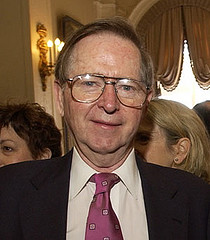Submitted by Anne Landman on
 The Public Relations Society of America, the trade group for the American public relations industry, and Jack O'Dwyer, who has specialized in reporting on the PR industry for over 40 years, are at war, and the battle is getting heated -- and harmful for PRSA.
The Public Relations Society of America, the trade group for the American public relations industry, and Jack O'Dwyer, who has specialized in reporting on the PR industry for over 40 years, are at war, and the battle is getting heated -- and harmful for PRSA.
Why should people care about this obscure fight? Because the conflict is a microcosm of the battle against the unethical and harmful PR trends that are hurting this country.
O'Dwyer's company, Inside News of Public Relations and Marketing Communications, publishes a monthly magazine, a daily blog, a weekly newsletter, and an annual ranking of PR firms that together have earned O'Dwyer a level of notoriety in the PR field. An article in the August 31, 2011 issue of Forbes magazine even called Jack O'Dwyer a "rather legendary" figure in the PR world. What makes O'Dwyer's publications unique is that they cover the PR industry from a journalistic standpoint, free from the one-sided, "rah-rah" boosterism that is the hallmark of most trade journals. O'Dwyer covers the PR industry, warts and all. He doesn't shy away from drawing attention to instances when PR professionals cross ethical lines. Thus O'Dwyer is one of the few people covering the PR industry who calls out bad behavior, as well as praising successes.
Like PRWatch, and an increasing cadre of PR veterans including investor relations pioneer Ted Pincus, who recently passed away, and the Center for Media and Democracy's own Senior Fellow on Health Care, Wendell Potter, O'Dwyer has been an open critic of the covert way many PR professionals have been operating over the last few decades.
At its inception, the PR industry was supposed to be a helping profession dedicated to fostering an honest, two-way dialogue between companies and the public, to help them better understand each other. As we at PRWatch have, Jack has observed that over the decades PR professionals have become increasingly manipulative and unethical, employing tactics to purposely hide the truth from the public, like establishing corporate front groups, commissioning purposely biased research and favorable opinions, and working through third parties to help alter public opinion. To further thwart journalists, corporate PR pros now increasingly require that any contact from the press and media be restricted to email only, so conversations can be managed by a company's legal and financial offices. The list of problems like this with the PR industry as a whole is long and growing, and O'Dwyer has been among those who have openly criticized this type of deterioration of PR.
As the Industry Goes, So Goes Its Trade Group
In the last few years, O'Dwyer has also started criticizing the industry's trade group, the Public Relations Society of America (PRSA), for mimicking this bad behavior by making moves that further obscure how PR professionals operate. O'Dwyer has openly objected to a host of PRSA's new practices, like the group's recent change to using listen-only teleconferences, where participants aren't allowed to speak. PRSA also adopted a policy prohibiting anyone at its meetings from recording presentations or taking photos. O'Dwyer also reports that in 2005, PRSA stopped issuing transcripts of their assemblies. All of these policies combined make it much more difficult to report on the group's activities.
O'Dwyer's list of grievances against PRSA -- and the above are only a fraction of them -- has made PRSA retaliate against O'Dwyer. PRSA started charging O'Dwyer a fee of $1,275 for each reporter his company sent to cover their conferences, while the giving out free passes to reporters from other publications that cover the PR trade, like PR News and PR Newser. PRSA also started confining O'Dwyer to the back of the room at their meetings, where it is difficult to hear speakers or sometimes identify who is speaking. When O'Dwyer asked for hearing assistance equipment to help him follow the proceedings, he was denied -- twice.
O'Dwyer's reporting provides the public with a window into the PR industry's activities. Blocking the public from being able to observe how PR professionals operate -- which is what PRSA is doing by denying Jack O'Dwyer credentials to cover to its meetings -- is the wrong way to react to criticism. Why? Because, in part, O'Dwyer's complaints against the PR industry, and now by extension to PRSA, are not just his own. They reflect the concerns of many PR industry watchers who see how modern changes in this industry further hide from the public how corporations operate, and are harming this country in ways American society has not seen before.
Moreover, PRSA's retaliatory moves against O'Dwyer's are more appropriate for a sandbox brawl than for PR professionals. PRSA's action to shut out O'Dwyer only confirm that PRSA is going the same way as the PR industry as a whole: towards more secrecy and obscurity from the public. That's one big, ominous omen for the country.
Preventing Jack O'Dwyer from covering their meeting -- even if O'Dwyer has criticized them roundly and asked questions they really don't like -- is a shameful and petty way for PRSA to deal with his critiques. It is also violation of freedom of the press that will damage PRSA's image long into the future.
Updated at 6:15 a.m. MDT

Comments
Dissembled Consent replied on Permalink
PRSA
TR Morris, APR replied on Permalink
Regarding Bernays & Ethics
Derek DeVries replied on Permalink
Seriously Misguided Criticism
Mutternich replied on Permalink
You can embed links,
Keith Trivitt replied on Permalink
Further PRSA Response re Our Letter to Mr. O'Dwyer
Pages